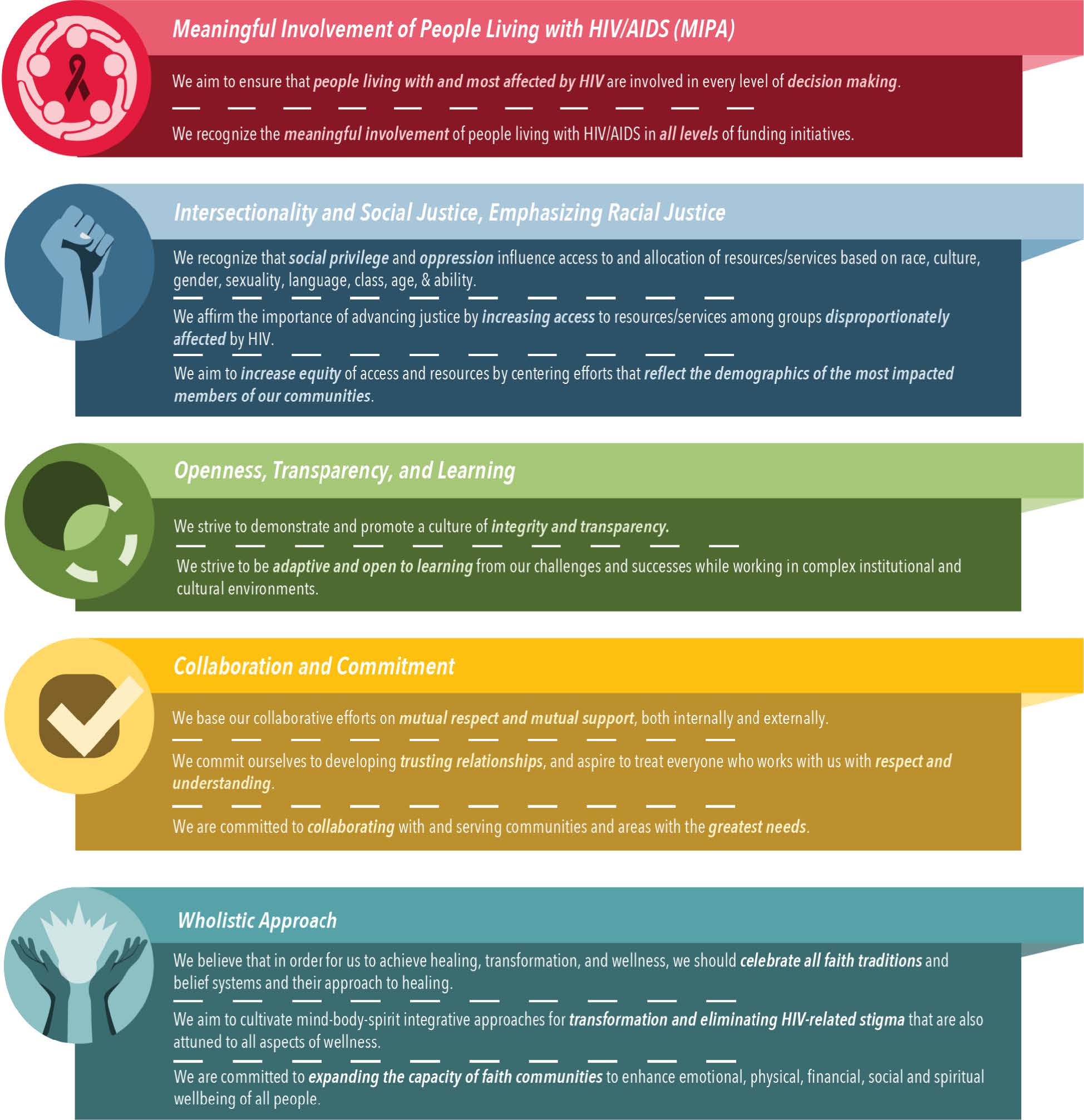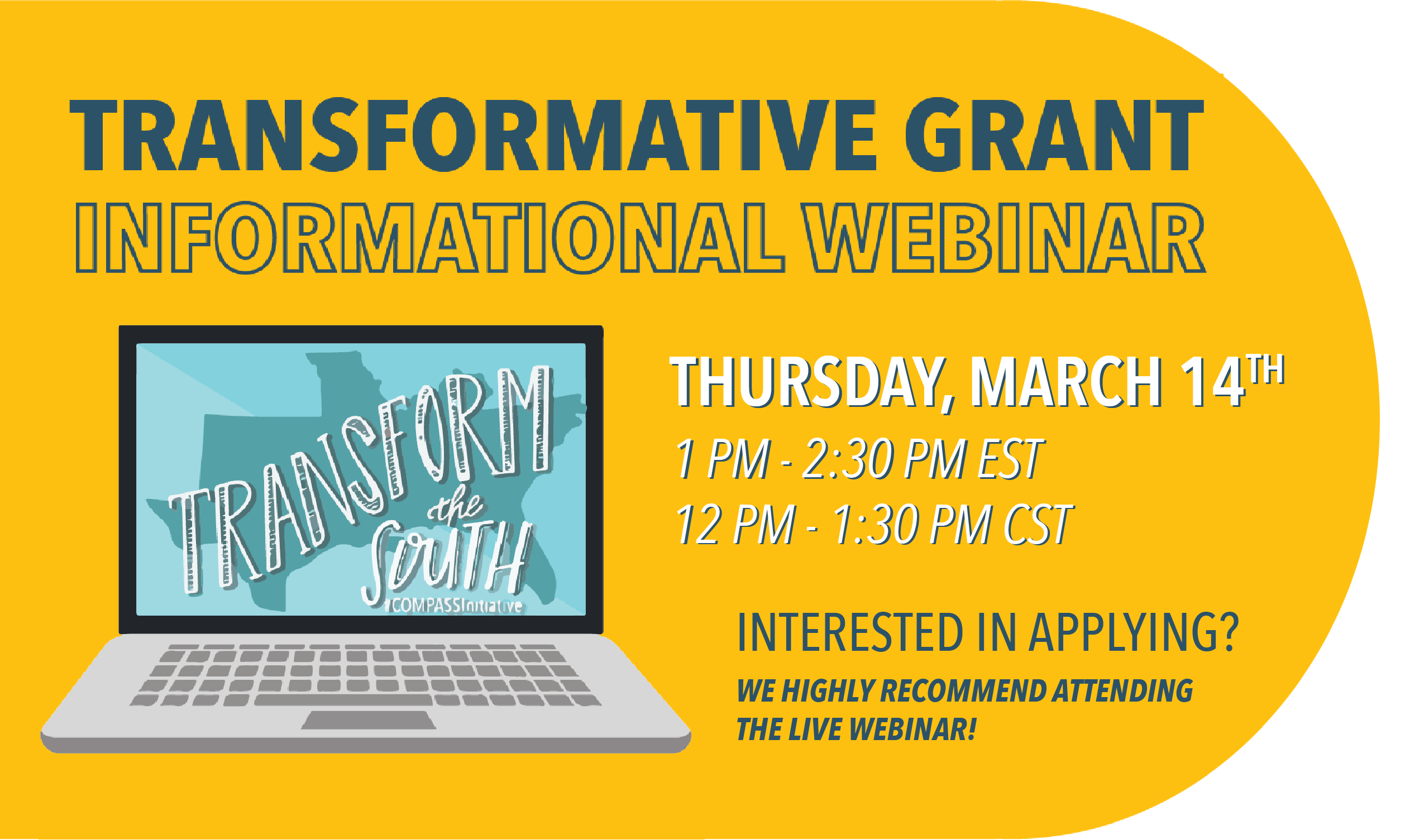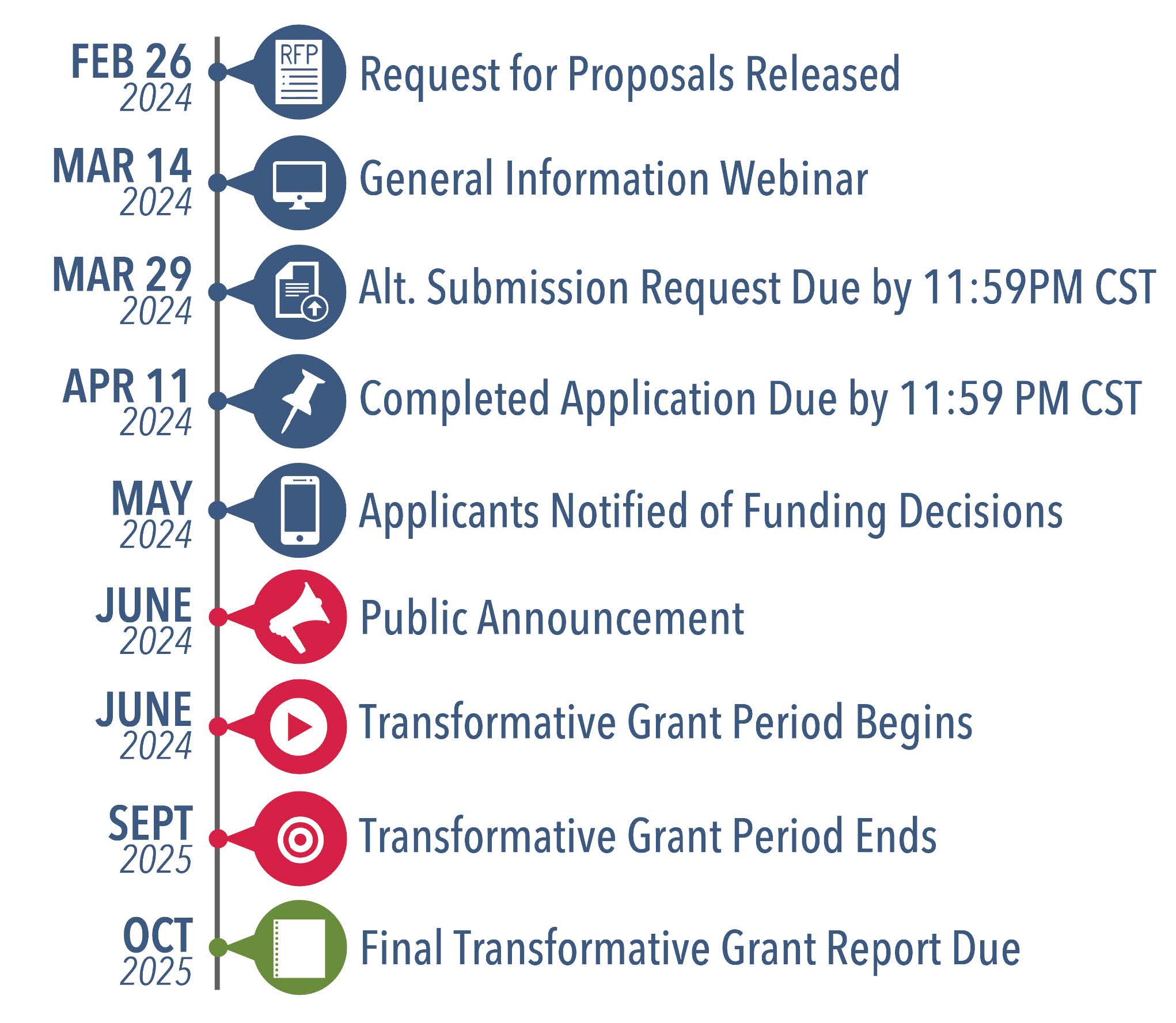Login to Complete an Application or to Access Judging Panel

Overview
Application Deadline: Thursday, April 11, 2024, 11:59PM CST
2024 Transformative Grants: Building Capacity in the South for Better Health Outcomes
FULL PDF OF RFP AVAILABLE HERE
HIV in the South
In the decades since 1981, when the first AIDS cases were reported in New York, San Francisco, and Los Angeles, the epicenter of the nation’s HIV epidemic has shifted from urban centers along the coast to the Southern United States. According to the Centers for Disease Control and Prevention (CDC), “the South now experiences the greatest burden of HIV infection, illness and deaths of any U.S. region, and lags far behind in providing quality HIV prevention and care to its residents” (CDC, 2019).
The disproportionate percentage of Southerners living with HIV speaks to a need to ensure that high-quality care for HIV and related services are geographically accessible, culturally appropriate, sustainable, and include holistic services (e.g., mental health and trauma-informed care). The disparate percentage of Southerners newly diagnosed with HIV demonstrates the need to have a broad network of prevention services that reach people who are disproportionately impacted by HIV. Care providers should also offer services that include components, such as trauma-informed care, that promote ongoing engagement in care and address stigmas within communities.
In addition to care providers, religious leaders and faith communities have a unique opportunity to change the HIV/AIDS narrative and landscape in the South. We aim to activate faith communities and their leaders to embody this redemptive and transformative work by collaborating with diverse partners to advance the capacity of a wide range of faith communities to effectively address the HIV/AIDS epidemic in the South. We believe the most effective way to respond to the HIV/AIDS challenge is to shift cultural narratives away from lack of understanding and stigma toward transformative, life-enhancing possibilities for those disproportionately affected by and those living with HIV/AIDS and their communities.
Who Are We
Focus Area: Building Organizational Capacity
Lead Coordinating Center: Emory University Rollins School of Public Health
This initiative will allow applicants to seek funding to support organizational capacity building activities in at least one of three focus areas: 1) Sustaining and Advancing Initiatives, 2) Organizational Mentoring and Twining and/or 3) Community/System Level Interventions.
Focus Area: Wellness/Wellbeing, Mental Health, Trauma-Informed Care, Substance Use, & Telehealth
Lead Coordinating Center: University of Houston Graduate College of Social Work
This initiative will focus on organizational change in trauma informed care, to include but not limited to, wellness, mental health, substance use (especially opioid use), and telehealth and its intersection with HIV in the Southern United States.
Focus Area: Reducing HIV- Related Stigma
Lead Coordinating Center: Southern AIDS Coalition
This initiative will focus on supporting the design, implementation, and evaluation of interventions to reduce HIV-related stigma.
Focus Area: Faith Based Advocacy & Spiritually Integrated Capacity Building
Lead Coordinating Center: Wake Forest University School of Divinity
This initiative will focus on building the capacity of faith leaders’ understanding of and engagement with their communities’ health challenges and opportunities, and equipping them to co-create with key community partners new holistic strategies for addressing HIV/AIDS and related health concerns.
To learn more about the COMPASS Initiative®, please visit our website at www.gileadcompass.com.
Transformative Grant Funding Opportunity
In addition to numerous structural and geographic barriers, there is a need for more intentional funding and directed efforts to eliminate HIV-related health inequities. The Transformative Grant provides direct and indirect funding to organizations working in the Southern United States to support the development of programs and activities that align with programmatic focus areas of the COMPASS Initiative® and builds the overall capacity of organizations across the U.S. South.
Transformative Grants provide HIV-serving organizations and faith-based organizations with funding and resources to enhance their capacity, such as provision and sustainability of high quality and accessible HIV education and care. Capacity building is an ongoing effort that aims to build knowledge and improve the skills of organizational staff to positively change an organization’s structures and systems in order to better serve communities. Capacity building is an investment that ultimately strengthens an organization’s mission, improves effectiveness and future sustainability, and most importantly, improves services for communities. This includes strengthening organizational infrastructure; creating upstream (structural) interventions planning like housing or transportation initiatives; developing grassroots, evidence-based, and/or anti-stigma interventions to enhance community mental health and wellness; and building brave and inclusive narrative spaces for LGBTQ+ persons to seek healing in community; and exploring faith and spirituality.
This funding opportunity aims to support:
- Creation or enhancement of systems and protocols;
- Strategic planning to adopt upstream (structural) public health interventions in HIV-care;
- Development of culturally appropriate, stigma-free interventions;
- Integration of mental health screenings, creation of trauma-informed and affirmative environments for communities; and/or
- Creation of inclusive faith spaces (virtual and/or in-person) for LGBTQ+ persons and people living with and affected by HIV that provide opportunities for physical, emotional, and financial wellness.
In short, the purpose of this capacity building grant is to help organizations improve internal organizational operations to better serve people living with and/or impacted by HIV in the US South by strengthening leadership, adaptability to organizational, programmatic and environmental changes, resource management, improving systems and skills, and supporting cultural values and norms.
Evaluation
There will be two levels of evaluation. The first level takes place within the COMPASS Coordinating Centers to assess success of individually funded programs. The second level will be with ETR, the COMPASS external evaluation partners who will assess the overall success of the Coordinating Centers. It is expected that funded community partners will collaborate on and participate in assessments with the Coordinating Centers and ETR to support the COMPASS evaluation efforts.
COMPASS Coordinating Center Level Evaluation
The COMPASS Coordinating Centers recognize that rigorous evaluation is an essential element of project success. Thoughtful evaluation helps us learn from the process of project implementation, develop organizational capacity, enhance community accountability, and identify effective practices. Evaluation is therefore integrated into every aspect of grant-funded projects, from initial project planning to outcome review and reflection. Coordinating Center staff will work with funded community partners to develop project-specific evaluation plans.
COMPASS External Evaluation Partner
Gilead and the Coordinating Centers (CCs) have partnered with ETR to serve as the COMPASS evaluator to facilitate continuous improvement through establishing data-driven programming, monitoring, and evaluation systems. ETR is a non-profit organization that advances health equity by designing science-based solutions and brings nearly four decades of experience in the field of HIV, Sexualand Reproductive Health, youth, and families. ETR may contact funded organizations throughout the funding initiative (https://www.etr.org/).
Why might ETR contact me?
ETR collaborates with the CCs to collect evaluation data from COMPASS Community Partners. Detailed roles and responsibilities for ETR include:
Developing, implementing, and tracking core metrics for COMPASS
- Establishing monitoring and evaluation systems for the collection, analysis, and routine reporting of key evaluation data
- Supporting the development of tools and processes to communicate overall COMPASS impact to key stakeholders
- Reporting outcomes and recommendations necessary for continuously improving programs and data collection
- Providing evaluation technical assistance and serving as a thought partner
- Sharing knowledge on the progress and impact of the initiative to all COMPASS stakeholders through data visualization tools
ETR has a fundamental commitment to centering the voices of community members in order to show the impact of programs. This commitment means ETR may contact community partners directly to engage in different evaluation activities that capture the impact of COMPASS programs across grants and collaborative learnings. ETR may contact funded Transformative Grant organizations. Some of the activities ETR may contact organizations for are listed below. Additionally, there may be other evaluation activities that ETR may ask you to participate in.
Interviews
- Most Significant Change (MSC) is an evaluation approach that relies on interviews with participants to learn how community partner involvement with COMPASS led to change in organizations and/or communities. Its aim is to understand and describe community partners’ perceptions about changes within their organizations and the communities they serve.
- Community Chronicles is a series that follows a subset of COMPASS partners that have received multiple awards across all CCs to tell the story of how participation in multiple programs across CCs have impacted the organizations and the communities they serve. Community Chronicles seeks to show how participation has contributed to the overall COMPASS goals.
Surveys
- An online grantee benefits assessment survey will be distributed once a year to COMPASS community partners to capture the full impact and benefit of participating in COMPASS programs.
- Online partner satisfaction surveys will be distributed annually to community partners to rate their satisfaction with all services received through COMPASS Coordinating Centers.
Your participation is ALWAYS voluntary and ETR will always prioritize community safety and confidentiality of participants. You can contact ETR at compass@etr.org.
Guiding Principles
The four COMPASS Coordinating Centers are committed to reflecting the guiding principles (shared values) described below through our implementation of this initiative, and will favor proposals from organizations that reflect principles of racial justice, non-discriminatory and non-stigmatizing care/services, and meaningful involvement of people living with HIV/AIDS.
Submitted proposals should clearly identify how these principles are prioritized throughout their agency and in service provision.
Click here to access the Coordinating Centers shared values.

Eligibility Information
It is important that applicants review this eligibility criteria carefully. Applicants may submit ONE completed Transformative Grant application for consideration for ONE COMPASS Coordinating Center content area. Only applications that meet the following eligibility criteria will be considered for funding:
Geographic Location
Applicants must be located in and doing work in one of the following twelve (12) Southern states: Alabama, Arkansas, Florida, Georgia, Kentucky, Louisiana, Mississippi, North Carolina, Oklahoma, South Carolina, Tennessee, and/or Texas.
Non-Profit Status
Applicants must be non-profit, tax-exempt organizations as set forth in section 501(c)(3) of the Internal Revenue Code. Applicants that do not hold 501(c)(3) status must have a fiscal sponsor.
Grant Period
Applicants must be able to complete work proposed within a 15-month period beginning in June 2024 and ending in September 2025.
Award Amount
The maximum amount an applicant can request varies by Coordinating Center (CC). Please check the CC specific Transformative Grant application for CC specific maximum award amount and other CC specific eligibility requirements.-
Application Deadline
Completed proposals are due via the COMPASS Initiative® website by Thursday, April 11, 2024 at 11:59 PM CT / 12:59 AM ET. Late applications will not be accepted. Applications must be completed and received by the deadline in order to be considered. We strongly encourage completing the application early to allow for unforeseen technical difficulties.
Questions about the application process should be emailed to info@gileadcompass.com. Please include “Transformative Grant” and your organization's name in the subject line of the message.
Application Webinars
Informational Webinar
The COMPASS Coordinating Centers will host an optional, live webinar for the purpose of providing further clarification about this request for proposals (RFP). The webinar will be recorded and made available on the COMPASS website, in the Resource Center, for future reference.
Additionally, each Coordinating Center may host one optional webinar to discuss their Center specific content in further detail.
CLICK HERE to register for the general Transformative Grant Informational Webinar on Thursday, March 14, 2024 at 12:00 PM-1:30 PM CT/ 1:00 PM-2:30 PM ET.

Application Process, Award Information, and Timeline
Review Process
Grant applications will be reviewed by an independent review committee composed of community members from each of the twelve (12) states eligible for funding and representing each of the areas of expertise of the three COMPASS Coordinating Centers.
Timeline

Application Requirements and Restictions
Application Requirements
- Applications should include appropriate references when citing data. There will be a section within the application designated to include references.
- Applications must include all required supplemental materials.. Applications that do not include all required information including supplemental materials will be considered incomplete and will not be considered for funding. Templates for supplemental materials are available within the application.
- Submitted applications must include two major sections: 1) Project Narrative and 2) Supplemental Materials.
Application Rubric & Scoring
CLICK HERE to view the description of the RFP components.
Restrictions
The following expenses and activities are prohibited by all Coordinating Centers:
Prohibited Expenses
- Medications or purchasing of medications;
- Direct medical expenses, including labs;
- Existing deficits;
- Basic biomedical research, clinical research, or clinical trials;
- Projects that directly influence or advance Gilead Science, Inc.’s business, including purchase, utilization, prescribing, formulary position, pricing, reimbursement, referral, recommendation, or payment for products;
- Individuals, individual health care providers, or physician group practices;
- Events or programs that have already occurred;
- Government lobbying activities; and,
- Organizations that discriminate on theteh basis of race, color, gender, religion, disability, sexual orientation or gender identity or expression.
Unallowable Activities
- Projects that focus on or include pre-exposure prophylaxis (PrEP);
- Procedures or policies that exclude community members from receiving adequate and efficient health care, safe shelter, advocacy services, counseling, and other assistance based on their actual or perceived sex, age, immigration status, race, religion, sexual orientation, gender identity, mental health condition, physical health condition, criminal record, work in the sex industry, or the age and/or gender of their children;
- Procedures or policies that compromise the confidentiality of information and/or privacy of persons being served at or by the applying organization/individual;
- Project designs and budgets that fail to account for the access needs of individuals with disabilities, with limited English proficiency, or who are deaf or hard of hearing;
- Projects that place a criteria or requirement for community members to access services;
- Project activities that promote or create an unsafe, uncomfortable, or counter-productive work environment;
- Project activities that exclude staff that are representative of the community members being targeted through this grant project from serving in leadership or advisory capacity;
- Grant funds may not be used to provide legal representation in civil and criminal matters, such as family law cases (divorce, custody, visitation, and child support), housing cases, consumer law cases, and other legal cases.
How To Apply
To apply for Emory University Rollins School of Public Health - Organizational Capacity Building click HERE.
To apply for Southern AIDS Coalition - HIV Related Stigma Reduction click HERE.
To apply for University of Houston - Wellness, Mental Health, Trauma-Informed Care, Substance Use, & Telehealth click HERE.
To apply for Wake Forest University School of Divinity - Faith-Based Advocacy & Spiritually Integrated Capacity Building click HERE.
View Full RFP HERE